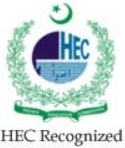
Y-Category
Open Access Policy
Open access means content is freely available without charge to the user or institution. Users are allowed to read, download, distribute, print, search, link to the full texts of the articles, or use them for any other lawful purpose without asking prior permission from the publisher or the author. Kashmir Journal of Science is committed to promoting the global knowledge exchange by free research available to the public. Therefore, it provides open access to all the published content immediately. Full text of articles is made available in the Archives section of the official website.
Licensing Policy
Kashmir Journal of Science uses CC-Creative Commons Attribution-Non Commercial 4.0 International License (CC BY-NC 4.0) to protect the author’s work from misuse. Under this license, the author(s) published in the journal retain the copyright and publishing rights of their scholarly work. All others using the content of Kashmir Journal of science are required to cite the names of the author(s) as well as of the journal in their work. Articles can be read and shared for noncommercial purposes under the following conditions:
BY: Attribution must be given to the source (Attribution)
NC: Works may not be used for commercial purposes (Noncommercial)
Plagiarism policy
Plagiarism, including duplicate publication of the author’s own work, in whole or in part without proper citation is not tolerated by the journal. Before submitting the manuscript to the journal online system, the authors should check the originality of the manuscript by Turnitin software or any of the other similar tools for checking similarity index. Overall, the similarity index should be below 19 %. Manuscripts submitted to the journal may be checked for originality using anti-plagiarism software.
Copyright
Authors retain the copyright of their manuscripts, and all Open Access articles are distributed under the terms of the Creative Commons Attribution-Non Commercial 4.0 International License, which permits non commercial unrestricted use, distribution, and reproduction in any medium, provided that the original work is properly cited.
Conflict of Interest
The editors, authors, and peer reviewers should disclose interests that might appear to affect their ability to present or review work objectively. These might include relevant financial interests (for example, patent ownership, stock ownership, consultancies, or speaker’s fees), or personal, political, or religious interests.
Peer review policy
The Associate Editor of the relevant section will evaluate the submitted manuscripts. Manuscripts rejected at this stage are insufficiently original, have serious scientific flaws, have poor grammar, or English language, or are outside the aims and scope of the journal. Those that meet the minimum criteria are normally passed on to at least two expert referees for review. Authors of manuscripts rejected at this stage will usually be informed. The referees are selected based on their expertise. Our reviewer database is constantly being updated.
The submitted manuscripts are accepted for publication in Kashmir Journal of Science after been critically reviewed and approved by at least two reviewers. The suggestions and recommendations of the reviewers and Editors, for corrections/amendments will be forwarded to the corresponding author, who will submit/upload the reviewed/revised manuscript within the stipulated time. The final decision regarding the acceptance/rejection will be made by the Editorial Board based on the comments of the reviewers.
The Kashmir Journal of Science employs anonymous reviewing, in which the referees remain anonymous to the author(s) throughout and following the refereeing process.
Complaints and Misconduct Policy
Kashmir Journal of Science is of the opinion that institutions and journals should promote best practices among researchers, authors, reviewers, and editors. To maintain the integrity and deal with misconduct allegations, the editor can be contacted at managing.editor@kjs.org.pk. The editor is responsible for investigating cases of misconduct by researchers and for finding misconduct that could affect the reliability or attribution of published work (e.g., fabrication or plagiarism). Where possible, evidence could be provided to support allegations of misconduct or questionable practices (e.g., copies of overlapping publications, evidence of plagiarism). Retractions or corrections are issued when provided with findings of misconduct arising from appropriate investigations. Hence, it is advised that the authors and reviewers should read the guidelines provided on the journal’s website and must be remained strictly adhere to all aspects of publication ethics.
Corrections and Retractions Policy
If there is suspicion of misbehavior or alleged fraud, the journal’s management will investigate following guidelines. If there are valid concerns after an investigation, the authors will be contacted and given an opportunity to address the issue. Depending on the situation, this may result in the journal and/or publisher’s implementation of the following measures, including, but not limited to:
The reason will be given in the published erratum/correction, editor’s note, editorial expression of concern, or retraction notice. Retraction means that the article is maintained on the platform watermarked “retracted,” and the explanation is provided in a note linked to the watermarked article.

Y-Category
The Kashmir Journal of Science (KrJS) is official publication of University of Azad Jammu & Kashmir. The KrJS is multidisciplinary peer reviewed open access journal. The KrJS welcomes submission of articles (Research & Review) in all scientific fields for the year 2025, which are not under review in any other conference or journal. The Journal does not charge a submission fee or Article Processing fee. For all details About this Journal and Articles Publication please click.